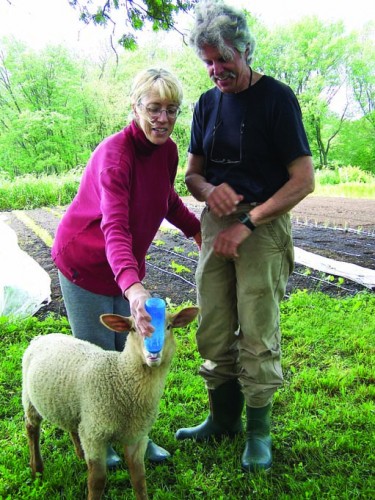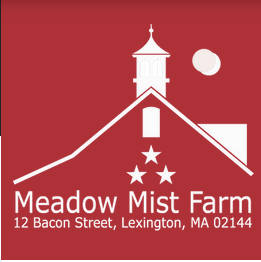Finding a Balance at Meadow Mist Farm
Twenty-four years ago, John Moriarty was just looking for a little bit bigger garden. What he found was a hidden gem and the mantle of reluctant folk hero.
In 1987, John was living in Arlington running his wordworking and construction business and taking care of his backyard garden. It was something he had done since childhood, working with his dad in the family plot. But John wanted to expand his little 500 square foot garden and he mentioned to his real estate broker that he’d like a property with more room to grow. When he got the call that she’d found, as John says, “something she thought would work for him,” John bumped up and down the ruts of Bacon Street and landed on the 5.5 acres of the old Meeks farm. It was love at first sight. “I looked around and got totally fascinated. It was more than I ever expected. All I could see around me was farm and field,” John says looking across those same fields with the same kind of wonder he must have felt that first day.
The land is part of a swath of old Lexington farmland that runs from Marrett Road to Waltham Street. The land between Meadow Mist and Marrett Road is still being cultivated and the area behind the farm is now conservation land that stretches to Clarke Middle School. John did some research and found that his “Meadow Mist Farm” had been owned and operated for nearly 80 years by the Meek family. Originally a dairy farm, the family switched over to growing produce in 1930s. Much of his history also comes from family members who continue to stop by. “Ever since I’ve been here members of the Meek family have dropped in and told me how wonderful it was growing up here or visiting family here.”
John moved into the old farmhouse and starting getting a handle on how to work his much expanded garden plot. “I got my first animals in late 1988. First I got a pig and eventually I got hens. Fundamentally, I learned by making a lot of mistakes.” John started out growing a good amount of corn, but it takes up a lot of space and you only harvest once a season. He still grows some corn, but has learned that succession crops like lettuces, greens and herbs give a much better return. And the pigs have given way to laying hens, chickens, lamb, and beef cows.
Meadow Mist didn’t start out to be a commercial farm, but John found he had way more than he could use so he reached out to friends and asked, ‘Would you like to buy some hamburger?’ From there he started selling fresh eggs, chicken, beef, produce and strawberries on a limited, but growing, basis.
“When I came out here no one was interested in farms,” John says. He sees the recent push for local produce and local farming as a teaching opportunity. “Part of having this is to have people learn what really happens on a farm. It’s life and death. One thing balances another. It all has to be in balance.” This commitment to balanced farming will sound familiar to people who have read Michael Pollan’s The Omnivore’s Dilemma.
Meadow Mist Farm has been using many of the techniques noted in the “Pastoral Grass” section of the book. Joel Salatin’s Polyface Farm in Virginia is most people’s first introduction to integrated farming. But, Moriarty says, it’s a technique he’s been using for years. The idea is pretty simple. John puts it this way, “You can use animals to restore the land, put a lot of animals in a small area for a short amount of time. That’s the way animals do it nature.” By regularly moving the animals, no one area is over-grazed and dies. At the same time the grazing and animal manure left behind nourishes the grasses and helps them regenerate, building them up for the next grazing rotation.
At Meadow Mist this technique is used for both the beef animals and the chickens. Squares of pasture are roped off and the cows graze for a short period in one square until moved to the next. The same can be done with chickens.

And this is where Moriarty is facing a new challenge on the farm. Right now, he has one “chicken tractor” in which about 30 chickens are pecking at the grass. A “chicken tractor” is a 10ft by 12ft movable pen with open sides, a covered top and no bottom. Once or twice a day the pen is dragged to a new plot of grass. The chicken manure left behind is rich in nitrogen and helps the grass regenerate. It is a perfect example of integrated farming. The pastures at Meadow Mist could support at least 2-3 more chicken tractors and John is anxious to expand that part of his operation.
In order to add more chicken tractors he will have to use existing pastures which fall within a wetlands buffer zone.
Before making a substantial financial investment, and in the spirit of compliance, Meadow Mist Farm has gone before the Conservation Commission seeking a negative determination which would officially exempt the land from Conservation Commission jurisdiction. Here’s where it gets interesting.
Mgl310-04 is the Massachusetts statute that governs wetland buffer zones used in commercial agriculture. If the land is found to fall under this statute, it is exempt from local conservation commission oversight. Both the conservation commission and the farm owners are working with legal counsel to understand the technicalities of Massachusetts agricultural law as it pertains to Meadow Mist. The farm has many supporters and the complicated legal issue has everyone feeling the pressure. At the Conservation Commission’s May 24 meeting, commission member Stu Kennedy acknowledged the situation. “I’m really in favor of this kind of activity if it is in the proper exemption. We have to get to the kernel…Is the exemption in place properly?”
Meadow Mist may find out the answer when they meet with the Conservation Commission at its June 21st meeting. But, the commission’s answer is just one step in the expansion process. “Even if this goes through there are still a lot of approvals to get,” and Moriarty is concerned about the message being sent to small farmers. “These operations are so marginal, if you make it too hard, you’re going to push a lot of these people out.”
But Moriarty and his partner Lauren Yaffee seem committed to staying put. They are building a new farm house, which will make room for more growing fields, and John has just planted rows of tender young blueberry bushes that won’t be ready to harvest for another three years. So Meadow Mist farm is here to stay.
“Back-to-the-Earth”, Non-chemical Micro-farming with Health & Heart in Mind
If youd like to purchase from Meadow Mist Farm or visit the operation it’s always a good idea to call ahead to check availability. You can reach them at 781-354-5037 or HERE

